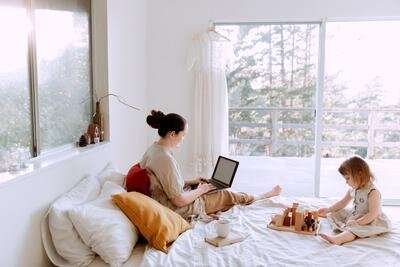Sandwich generation feels the pressure during lockdown

The sandwich generation—those supporting both children and parents—are facing heightened emotional and financial pressures during the COVID-19 pandemic, according to findings from the Centre for Population Change (CPC).
The research by Professor Maria Evandrou, Professor Jane Falkingham, Dr. Min Qin and Professor Athina Vlachantoni of the CPC and University of Southampton found that people whose living arrangements have changed because of the COVID-19 lockdowns and restrictions are more likely to experience increased stress and family conflict than those whose living arrangements have not changed.
As our population ages, it is increasingly common for people, particularly in mid-life, to be supporting older children, while also providing informal care for family or friends. These dual-carers often provide informal care for others as well as carrying out paid employment. The pandemic has intensified the responsibilities of these individuals, and brought new challenges for those 'in the middle."
Around seven million people in the UK are informal carers, according to the Carers Trust. The CPC has been carrying out research into the pressures on carers and more specifically the 'sandwich generation," finding that, even before COVID-19 they faced emotional and financial pressures, and diminishing social interactions. This has been made worse by the pandemic, with the Carers Trust stating that "coronavirus has significantly exacerbated burnout among unpaid carers."
An April 2020 a Carers UK survey into the experiences of over 5,000 current and former unpaid carers found that "the coronavirus crisis is having a profound impact on carers' lives. Many of those who responded were providing very high levels of care, or juggling care in complex lives." A follow-up report in October 2020 found that four in five unpaid carers were providing more care than before the pandemic, with more than half of carers seeing their physical health impacted by caring through the pandemic, and 64% saying their mental health has worsened.
With this upsurge in pressure on carers, CPC researchers are working to unpick the impact of coronavirus on carers, one area they are investigating is how living arrangements have changed due to lockdowns. Where people were only providing occasional care and support before the pandemic, they may have been unexpectedly placed in a situation where they are living, albeit temporarily, with those they care for. Or it may be more difficult to provide care due to lockdown restrictions and having to live apart with very little contact to protect those who are vulnerable and shielding.
The findings show that younger people were more likely than older people to have changed their living arrangements—this has usually meant moving back in with their parents. These households were more likely to report higher levels of stress. This in turn has important implications for public health and wider policy as prolonged periods of stress can lead to serious health problems.
Professor Evandrou comments, "At first sight, the changes in living arrangements caused by the COVID-19 could be seen as positive, as returning young adults benefit from the resources of the parental home, and older parents receive support from younger household members. An unexpected move, however, can also cause stress. For example, young people could feel they have lost their independence. Those in mid-life could struggle with having their grown-up children and even grandchildren living at home again, whilst potentially also having to provide care to older family members. Within a household, members provide and receive emotional, instrumental and financial support. Stress and conflict, however, can flare up when people believe that resources and demands for support are not equal. This stress can then lead to longer term health risks."
There is also a gendered aspect to the caring responsibilities faced by many in mid-life. People in mid-life who have caring responsibilities are more likely to reduce the amount of paid work they do in order to provide care if they are female, single, are in lower paid employment, have poor health themselves and have frequent contact with their parents. "In general, we know women are more likely to provide more intensive personal care to older relatives than men, with men providing support for practical tasks including finance and gardening," explains Professor Vlachantoni.
The isolation caused by lockdown restrictions may also be disproportionality impacting carers. Not being in a position to socialize or access local support or respite services outside the home could add further challenges for carers. Among carers, time, energy and finances are the main barriers to social participation. A 2019 survey by Carers UK found 72% of carers reported mental health problems and 61% said they had physical health problems as a result of caring. However further research within the CPC has found that social participation can potentially alleviate the adverse effects of care provision.
While the pandemic may have narrowed the options for carers to socialize, it has begun to normalize flexible working. This could increase understanding of the pressures carers are under from employers, families and friends. "I've always found that effective policy tools are the ones that give individuals real choice," reflects Professor Vlachantoni.
"One positive outcome of the COVID-19 pandemic is the introduction of greater flexibility in working from home, although this also comes with challenges for many workers. Our research findings have shown that providing more flexible working hours and enhancing paid care leave in the workplace could be pivotal for mid-life carers who currently work or who wish to combine caring with paid work. Our hope is that the government and employers will learn from this experience and incorporate these lessons into making a more inclusive workplace for all."
She concludes, "Employers can also help support employees going through negative life events. This could be through greater flexibility in leave policies or the provision of free psychological counseling services during times of pressure. Looking to the future, with the number of informal carers set to rise, it will be vital for the government and employers to recognize the vital role carers play within society and support them accordingly."



















